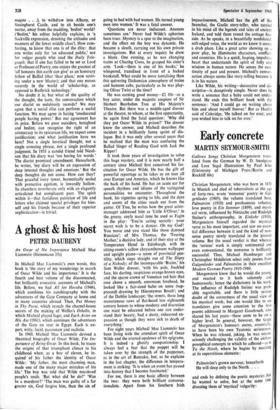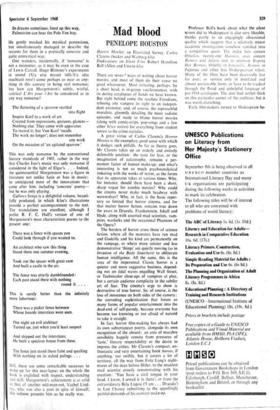Early concrete
MARTIN SEYMOUR-SMITH
Gallows Songs Christian Morgenstern trans- lated from the German by W. D. Snodgrass and Lore Segal illustrations by Paul Klee (University of Michigan Press/Barrie and Rockliff 60s) Christian Morgenstern, who was born in 1871 in Munich and died of tuberculosis at the age of forty-two, wrote 'nonsense' poetry in Gal- genlieder (1905), the volume translated here, Palmstrom (1910) and posthumous volumes, love poetry in Ein Sommer (1899), and mysti- cal verse, influenced by Nietzsche and Rudolph Steiner's anthroposophy, in Einkehr (1910). Morgenstern himself regarded the mystical verse as his most important, and saw no essen- tial difference between it and the kind of non- sense poetry newly translated in the present volume. But the usual verdict is that whereas the 'serious' work is simply sentimental and even conventional, the nonsense is brilliantly successful. Thus, Michael Hamburger and Christopher Middleton select only poems from Galgenlieder and Palmstrom in their excellent Modern German Poetry 1910-1960.
Morgenstern knew that he would die young, and reacted to it both solemnly and humorously; hence the dichotomy in his work. The influence of Rudolph Steiner was prob- ably regrettable, and there is little serious doubt of the correctness of the usual view of his mystical work; but one would like to see translators give some attention to the love poems addressed to Margaret Gosebruch, who shared his last years—these seem to be on a higher level. In general, however, the target of Morgenstern's humours seems, essentially, to have been his own Teutonic seriousness. When he was relaxed, joking, he was uncon- sciously challenging the validity of the anthro- posophical concepts to which he adhered—as in To the North, where he begins by mocking at its superstitious elements: Palmstrom's grown nervous; henceforth He will sleep only to the North. . . .
and ends by defining the poetic mysteries that he wanted to solve, but at the same time divesting them of 'mystical' vulgarity :
In dreams sometimes, lined up this way, Palmstrom can hear the Pole Fox bay.
He gently mocked his mystical pretensions, but simultaneously managed to describe the reasons for them in a poetically concrete and quite unmystical way.
One wonders, incidentally, if 'nonsense' is not a misnomer, as it may be even in the case of Lewis Carroll. Hugo Bliimner's experiments in sound (`Ua sesa masa+ tt luJUa sesa machiato toro') come perhaps as near as any- thing in this century to being real nonsense; but how can Morgenstern's subtle, wistful, satirical L'Art pour l'Art be considered as in any way nonsense?
The fluttering of a sparrow startled into flight Inspire Korf to a work of art Created from expressions, gestures, glances— Nothing else. They come with apparatus To record it; but Von Korf 'recalls The work no longer'; does not remember any work On the occasion of `an agitated sparrow.'
This was only nonsense by the conventional literary standards of 1905, rather in the way that Charles Ives's music was only nonsense if considered in the light of Elgar's. . Indeed, the quintessential Morgenstern was a figure in literature not unlike Satie or Ives in music: he anticipated most of the innovations that came after him, including 'concrete' poetry— but he was only playing.
Gallows Songs is a delightful volume, beauti- fully produced, in which Klee's illustrations provide a perfect accompaniment to the text. The translations are excellent, although I prefer R. F. C. Hull's version of one of Morgenstern's most characteristic poems to the present one:
There was a fence with spaces you Could look through if you wanted to.
An architect who saw this thing Stood there one summer evening, Took out the spaces with great care And built a castle in the air.
The fence was utterly dumbfounded: Each post stood there with nothing round it. . . .
This is surely better than the infinitely more laborious: There was a picket fence between Whose boards interstices were seen.
One night an evil architect Turned up, just when you'd least suspect And shipped out the interstices; He built a specious house from these.
The fence just stood there faint and quailing With nothing on its naked palings...
Still, there are some remarkable successes to make up for this near-lapse; on the whole the book is englished with respect, understanding and skill. Morgenstern's achievement is as solid as that of another odd-man-out, Vachel. Lind- say, who was also a poet in spite of himself; this volume presents him as he really was.







































 Previous page
Previous page